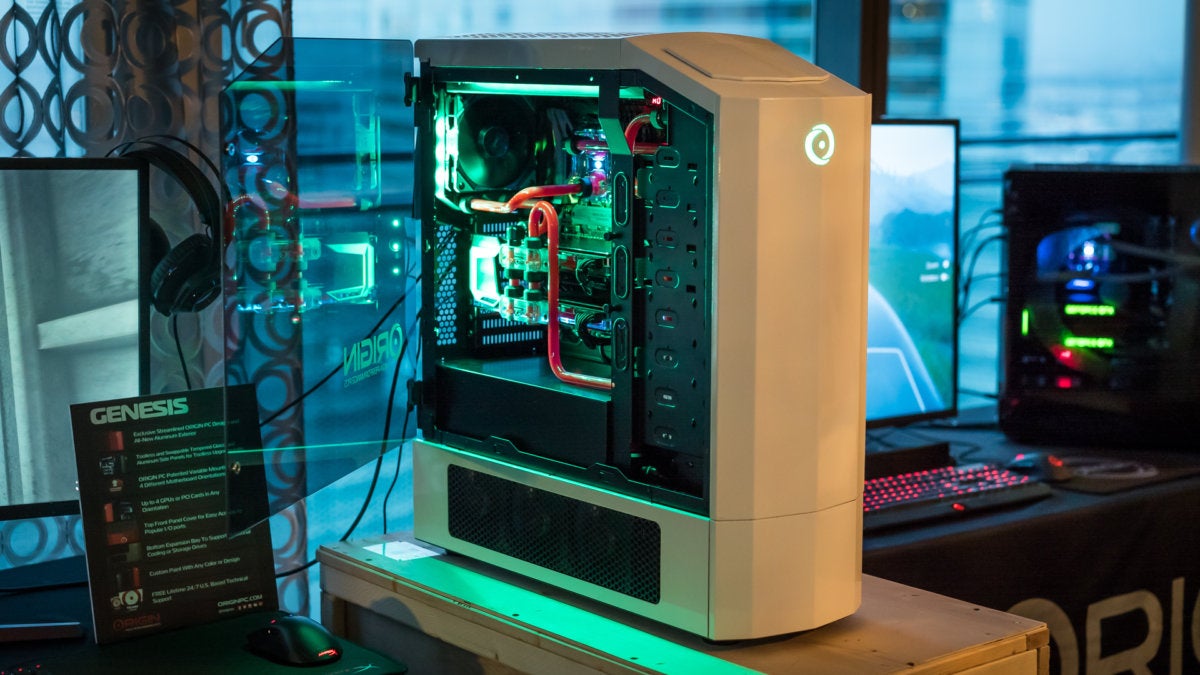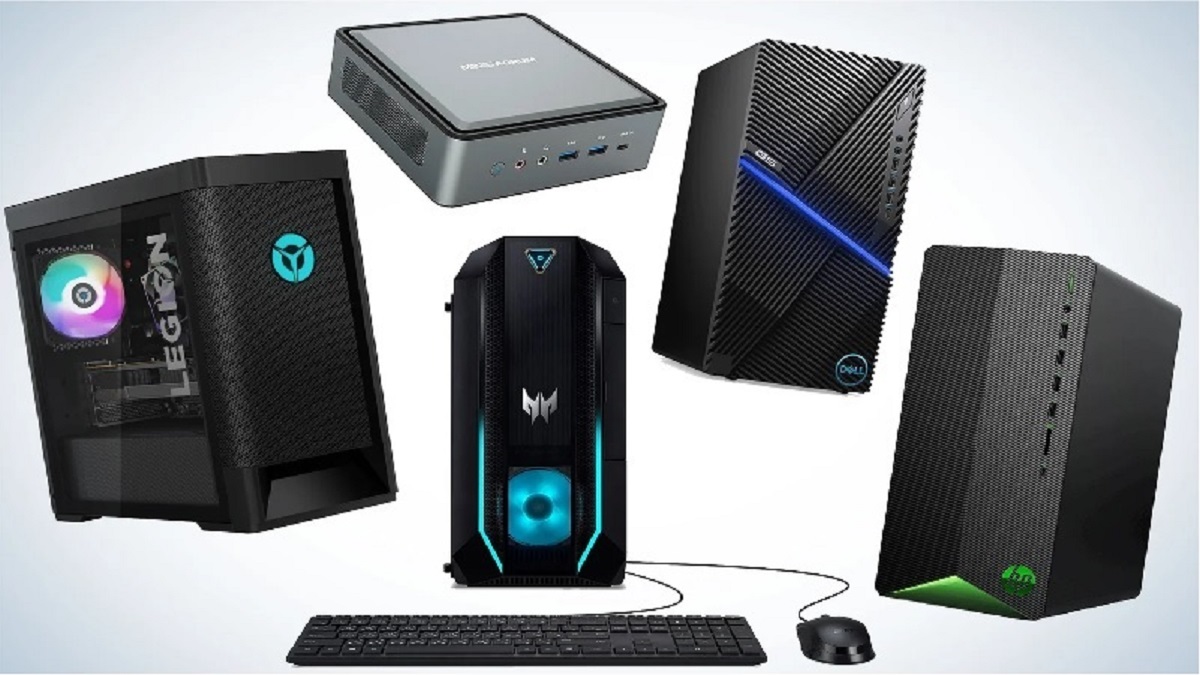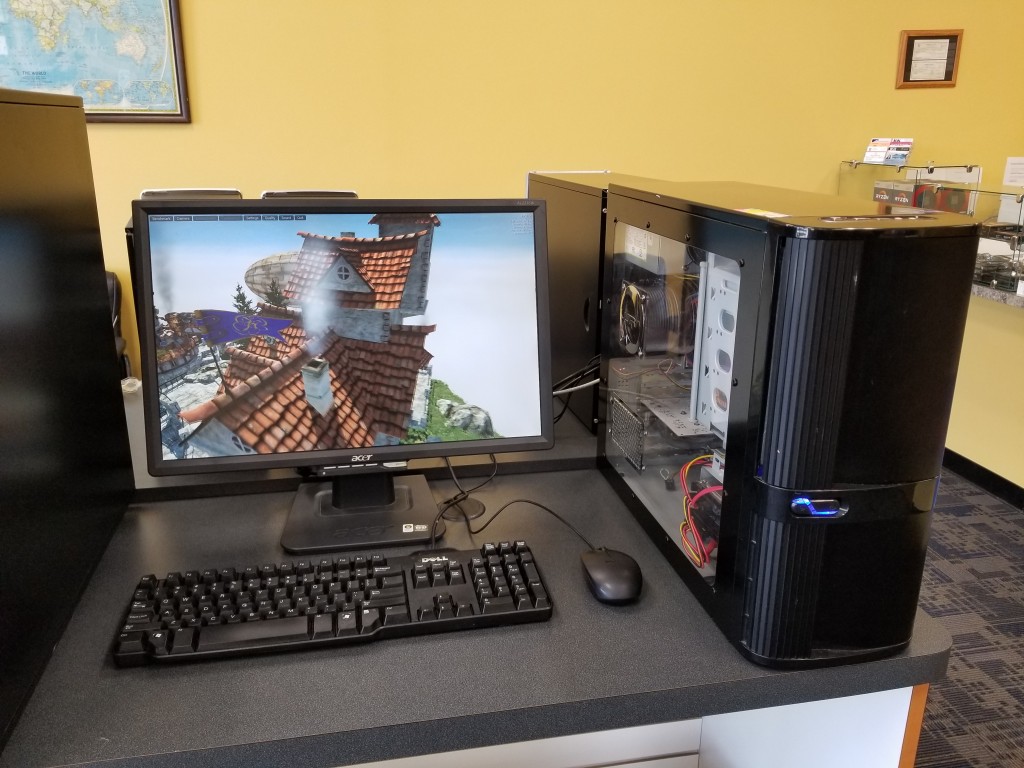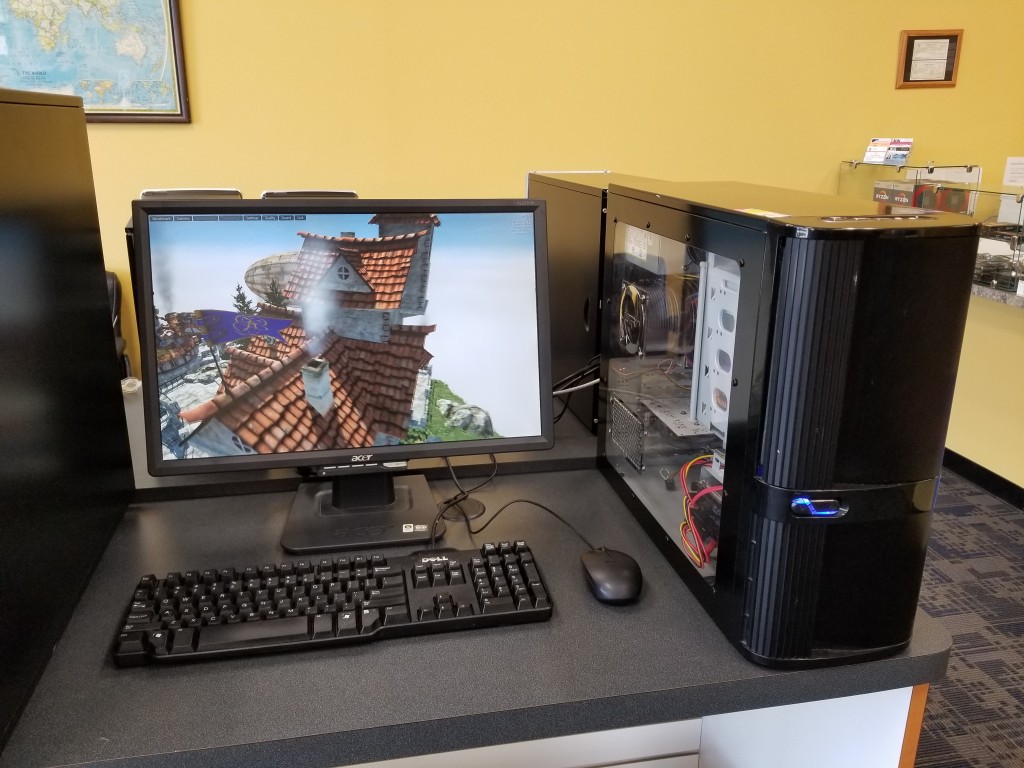Secondhand gaming PCs offer a compelling alternative to new builds, often providing impressive performance at a significantly reduced cost. This guide dives deep into the world of used gaming PCs, exploring everything from identifying quality machines to setting them up and maintaining them. Whether you’re a seasoned PC gamer or a newcomer, this comprehensive resource equips you with the knowledge needed to navigate the used market successfully.
We’ll explore the advantages and disadvantages of buying used, examine crucial factors for assessing quality, and discuss effective strategies for finding, purchasing, and optimizing your new-to-you gaming rig. Understanding the components and potential pitfalls is key to making an informed decision. From identifying common problems to optimizing performance for specific games, this guide is your go-to resource for mastering the used gaming PC landscape.
Introduction to Secondhand Gaming PCs
Secondhand gaming PCs represent a significant portion of the market for PC enthusiasts and gamers on a budget. This market caters to those seeking powerful gaming hardware without the hefty price tag of a brand-new system. The availability of used PCs often allows for more customization and specialized configurations, appealing to a broad range of players.Used gaming PCs offer a viable alternative to purchasing new systems.
Understanding the advantages and disadvantages, along with the common components and price ranges, is crucial for informed decision-making. The performance and reliability of a used PC will vary depending on the previous owner’s care and the overall condition of the components.
Market Overview and Use Cases
The secondhand gaming PC market thrives on the desire for affordability and performance. This market is often driven by those seeking to upgrade their current setup or enter the world of gaming with a budget-friendly solution. Used gaming PCs are particularly popular among students, casual gamers, and those looking to build a powerful rig without the initial investment.
Advantages and Disadvantages of Used Gaming PCs
Purchasing a used gaming PC presents a compelling alternative to a new one. A significant advantage is the often lower price compared to a comparable new system. This cost savings can be substantial, allowing for more funds to be allocated towards other aspects of the gaming experience, such as peripherals or software.However, purchasing a used PC involves inherent risks.
The previous owner’s usage history and maintenance practices are unknown, potentially leading to issues with performance, reliability, or component lifespan. A thorough inspection and potential testing are essential to mitigate these risks.
Common Features and Components
Used gaming PCs typically feature a variety of components, reflecting the diversity of the market. Common components include CPUs (Central Processing Units), GPUs (Graphics Processing Units), RAM (Random Access Memory), storage drives (HDDs and SSDs), and power supplies. The specific configuration varies greatly, depending on the age and intended use of the PC. The availability of these components will depend on the specific listings available in the market.
Price Range for Configurations
The price range for used gaming PCs is diverse, spanning from budget-friendly systems suitable for casual gaming to high-end configurations that can handle demanding AAA titles. A system with a mid-range GPU and a slightly older CPU can be purchased for a few hundred dollars, while a more powerful system with a recent-generation GPU can command a higher price.
The specific price will be influenced by the condition, components, and performance capabilities of the PC. Prices are very dependent on the current market trends and the condition of the components.
New vs. Used Gaming PCs Comparison
| Feature | New Gaming PC | Used Gaming PC |
|---|---|---|
| Cost | Higher | Lower |
| Performance | Generally high, reflecting current technology | Variable, depending on the specific configuration |
| Reliability | Generally high, with new components | Variable, dependent on previous owner’s care |
The table above provides a concise comparison between new and used gaming PCs. New systems are typically more expensive but offer the most current technology, potentially resulting in higher performance and better reliability. Used PCs can offer substantial cost savings but may require careful consideration of performance and reliability.
Identifying Quality Secondhand PCs

Finding a great secondhand gaming PC requires careful evaluation. While the price is often a major draw, overlooking crucial factors like hardware condition and performance can lead to disappointment. Understanding the key elements for assessing quality is essential for making an informed decision.
Evaluating Performance Based on Specifications
Performance evaluation hinges on the PC’s components. A powerful processor (CPU) and graphics card (GPU) are crucial for smooth gaming. Consider the clock speeds and core count of the CPU, and the GPU’s memory capacity and clock speed. Look for models that meet your desired frame rates at your preferred resolution. For example, a high-end CPU paired with a mid-range GPU might be sufficient for 1080p gaming but may struggle with 1440p or 4K.
Assessing Overall Condition
Beyond specifications, the physical condition significantly impacts longevity and reliability. Examine the PC for signs of damage, such as bent components, loose connections, or corrosion. Verify that all components are securely installed. The thermal paste on the CPU and GPU should be checked; if dry or cracked, it might need replacement. Check the case for dust buildup, as this can affect cooling and potentially lead to component failure.
Importance of Reviews and Seller Reputation
Buyer reviews and seller reputation provide crucial insights into the secondhand PC’s reliability. Look for patterns in feedback, focusing on the seller’s communication, responsiveness, and the overall satisfaction of past buyers. Negative reviews often highlight specific issues, offering clues about potential problems. Verified purchases and positive reviews from other buyers are important factors.
Common Problems and Identification
Used gaming PCs can present various issues. Overheating is a common problem, which can be identified by high temperatures, fans running constantly, or unusual noise. Failing components like the hard drive or RAM can lead to system instability or crashes. Look for indications of previous repairs or replacements. Incompatible software can cause conflicts, requiring updates or reinstalling.
Look for system errors or warnings during the initial startup and test processes.
Comparison Table of Quality Metrics
| Metric | Processor | GPU | RAM | Storage | Condition |
|---|---|---|---|---|---|
| Processor Speed (GHz) | Intel Core i5-10400F or AMD Ryzen 5 5600X | NVIDIA GeForce RTX 3060 or AMD Radeon RX 6600 | 16GB DDR4 or 32GB DDR4 | 1TB NVMe SSD | Excellent (no visible damage) |
| GPU Memory (GB) | 8 cores | 8GB GDDR6 | 3200MHz | PCIe 4.0 | Good (minor scratches or signs of use) |
| RAM Frequency (MHz) | 3.7 GHz | 1440p 60 FPS | 3200MHz | Fast boot time | Fair (noticeable signs of use) |
| Storage Type | SSD | Poor (significant damage or missing parts) | |||
| Overall Condition | Look for heat sinks and fans in good condition. | Inspect for bent or damaged components. | Check for signs of damage or wear. | Verify that the drive functions without errors. | Assess the overall aesthetic condition of the PC. |
Finding and Purchasing Secondhand Gaming PCs
Securing a quality secondhand gaming PC involves careful research, evaluation, and negotiation. This process can save you significant money compared to purchasing a new system, while still enabling you to enjoy a powerful gaming experience. Understanding the available platforms, verifying sellers, and performing thorough inspections are crucial steps in the journey.
Online Platforms for Purchasing
Various online platforms facilitate the purchase of secondhand gaming PCs. These platforms offer diverse listings, allowing users to compare specifications, prices, and seller reputations. The accessibility and broad reach of these marketplaces make them convenient for buyers seeking to acquire used gaming equipment.
Trusted Online Marketplaces
Numerous online marketplaces cater to the sale of secondhand gaming PCs. Reputable platforms often include buyer protection measures and provide a structured environment for transactions. A few well-regarded options include eBay, Facebook Marketplace, Craigslist, and specialized forums dedicated to PC gaming. These sites often host detailed product listings, allowing prospective buyers to compare and contrast various configurations.
Negotiating Prices
Negotiating prices is a common practice in the secondhand market. Begin by researching comparable listings for similar configurations and identify reasonable price ranges. Articulating your rationale for a lower price, based on the PC’s specifications and market value, can enhance your negotiating position. Be polite, respectful, and prepared to walk away if the seller is unwilling to meet your desired price point.
Thorough Inspection Before Purchase
Thorough inspection is paramount before finalizing a purchase. Carefully examine the PC’s physical condition, looking for signs of damage, wear, or neglect. Verify the listed specifications by testing the components, including the graphics card, processor, and RAM. Running diagnostic tests and checking for any unusual noises or overheating issues is essential to assess the PC’s overall health.
Safe and Successful Purchasing Steps
| Platform | Seller Verification | Payment Methods | Safety Precautions |
|---|---|---|---|
| eBay | Check seller feedback and ratings, review their profile for legitimacy. | Utilize escrow services or buyer-protected payment options offered by the platform. | Verify the authenticity of the product listing and seller’s information before initiating payment. |
| Facebook Marketplace | Scrutinize the seller’s profile and past interactions. Request multiple photos and videos. | Preferably use a payment method that allows for refunds or dispute resolution. | Meet in a public place and have a friend or family member accompany you for added security. |
| Craigslist | Be cautious; verify the seller’s legitimacy with references. | Use a payment method allowing for refunds or dispute resolution. | Never wire money or send payment without meeting the seller in person. |
| Specialized Forums | Establish rapport with the seller, and check the forum’s reputation and guidelines for transactions. | Utilize reputable payment methods like PayPal with buyer protection. | Follow established forum guidelines and communication protocols for a secure transaction. |
Setting Up and Maintaining Secondhand Gaming PCs
Bringing a secondhand gaming PC home is exciting, but setting it up and ensuring it performs optimally requires attention to detail. Proper installation, configuration, and troubleshooting are crucial for a smooth gaming experience. Knowing potential compatibility issues and how to maintain the system are vital to maximizing its lifespan and performance.Understanding the intricacies of a secondhand PC’s hardware and software configuration is key to a successful setup.
This includes knowing how to install drivers, optimize settings, and potentially identify and address any pre-existing issues. Maintaining a used PC involves preventative measures and troubleshooting techniques to keep it running smoothly and avoid costly repairs.
Installing and Configuring a Secondhand PC
Before connecting any components, carefully inspect the PC’s contents and ensure all parts are present. This prevents costly errors during the installation process. Follow the manufacturer’s instructions for each component. Installing the operating system (OS) is a crucial step; choose an OS compatible with the PC’s hardware. Crucially, install all necessary drivers.
Proper configuration involves optimizing settings like power management and cooling to enhance performance and stability.
Troubleshooting Common Issues
Used gaming PCs might present various problems. Troubleshooting involves systematically identifying the root cause and implementing appropriate solutions. A thorough understanding of the PC’s hardware and software components is essential for effective troubleshooting. For example, slow performance could stem from outdated drivers, insufficient RAM, or a cluttered hard drive. Similarly, crashes could be due to faulty hardware, corrupted files, or inadequate cooling.
Maintaining and Upgrading Secondhand Gaming PCs
Regular maintenance is crucial for prolonging the life of a secondhand gaming PC. This includes cleaning dust from the components, checking cable connections, and ensuring adequate cooling. Upgrading components, such as adding more RAM or a faster graphics card, can significantly enhance performance. However, ensure compatibility with existing hardware before upgrading.
Potential Compatibility Issues
Compatibility issues are a significant concern with secondhand gaming PCs. Different hardware components may not work together seamlessly. For instance, a new graphics card might not be compatible with the motherboard or power supply. Similarly, the OS might not be compatible with specific hardware or drivers. Careful research and thorough checks are necessary to prevent such problems.
Troubleshooting Table
| Problem | Possible Cause | Solution |
|---|---|---|
| Slow Performance | Outdated drivers, insufficient RAM, fragmented hard drive, or high background processes. | Update drivers, upgrade RAM, defragment the hard drive, or close unnecessary programs. |
| Crashes | Faulty hardware (e.g., RAM, GPU), corrupted files, overheating, or driver conflicts. | Check hardware for damage, run file integrity checks, ensure adequate cooling, or update drivers. |
| Driver Issues | Missing drivers, outdated drivers, or driver conflicts. | Install or update missing or outdated drivers, check for conflicts, or reinstall the OS. |
| No Display Output | Issues with the monitor, graphics card, or display cable, incorrect connections. | Check connections, ensure the monitor is working, or test the graphics card on another system. |
Performance and Customization
Secondhand gaming PCs offer a compelling alternative to new systems, especially for budget-conscious gamers. However, understanding how to optimize their performance and customize them for specific needs is crucial. This section explores these aspects, providing practical insights and strategies for getting the most out of your used gaming rig.
Customizing Secondhand PCs
A secondhand gaming PC provides a canvas for customization. Components like the CPU, GPU, RAM, and storage can be upgraded to enhance performance. Careful consideration of compatibility is essential, as not all components from different manufacturers or generations will work seamlessly together. This section explores the possibilities and challenges associated with upgrading and tweaking these machines.
Optimizing Performance for Different Games
Gaming performance is not a one-size-fits-all scenario. Different games demand varying levels of processing power and graphical fidelity. To optimize performance for a specific game, consider the game’s technical requirements and adjust settings accordingly. Adjusting graphics settings within the game itself is often the first step. Further optimization may involve tweaks to the PC’s power management settings, or more advanced techniques like overclocking.
Upgrading Components: Pros and Cons
Upgrading components in a secondhand PC offers the potential for significant performance improvements. However, this decision should be carefully weighed against the costs and potential compatibility issues. A key pro is improved performance for specific games. Cons may include higher costs for components and potential complications if the upgrade is not carefully planned. Assessing the current components’ capabilities and the desired performance improvements is critical.
Common Customization Options
Numerous customization options exist for secondhand gaming PCs. These include upgrading the CPU, GPU, RAM, storage, and cooling systems. Consider the specific needs of the games you want to play, the budget you have, and the current capabilities of the PC. For example, upgrading to a more powerful graphics card will improve visual fidelity, while adding more RAM can improve multitasking and overall responsiveness.
High-capacity storage can accommodate larger game files.
Optimizing Performance Based on Gaming Needs
The following table Artikels steps for optimizing performance based on different gaming needs. Adjusting in-game settings to lower resolution, textures, and effects can dramatically increase frame rates. Advanced optimization techniques, like overclocking and tweaking power settings, should be undertaken with caution.
| Game | Settings | Optimization Steps |
|---|---|---|
| Call of Duty: Modern Warfare III | High Resolution, Ultra Textures, High Effects | Reduce resolution to 1080p, textures to medium, and effects to low. Consider adjusting V-Sync and other in-game settings. Monitor CPU and GPU usage to fine-tune further. |
| Grand Theft Auto V | Ultra Settings | Reduce resolution, textures, and effects to lower settings. Adjust in-game settings like shadow quality, and ambient occlusion to optimize performance. Monitor CPU and GPU usage for optimal settings. |
| Cyberpunk 2077 | Ultra Settings | Lower resolution, textures, and effects. Adjust draw distance, shadows, and other settings in the game to find a balance between visual quality and frame rate. Consider adjusting power settings for optimal performance. |
Component Analysis

Understanding the components of a secondhand gaming PC is crucial for assessing its performance and potential. Different components interact to create a gaming experience, and knowing their individual strengths and weaknesses helps in making informed purchasing decisions. Factors like age, generation, and manufacturer all play a role in determining the overall value of a secondhand system.
Central Processing Unit (CPU)
The CPU is the brain of the computer, handling all the calculations and instructions. A more powerful CPU allows for smoother gameplay and more complex operations. Higher clock speeds and more cores translate to faster processing. Modern CPUs are often multi-threaded, meaning they can handle multiple tasks simultaneously. This is especially important for games that require complex calculations.
Graphics Processing Unit (GPU)
The GPU is responsible for rendering graphics, which directly impacts visual quality and frame rates. A powerful GPU ensures smoother visuals and higher frame rates, leading to a more immersive gaming experience. The amount of video memory (VRAM) is also important, as more VRAM allows for more complex and detailed graphics.
Random Access Memory (RAM)
RAM is the computer’s short-term memory, holding data that the CPU needs to access quickly. More RAM allows the system to handle more tasks simultaneously, improving responsiveness and multitasking capabilities. Higher RAM speeds also contribute to smoother performance. Insufficient RAM can lead to performance bottlenecks, especially when running demanding games.
Storage
Storage devices, like hard disk drives (HDDs) and solid-state drives (SSDs), are crucial for storing game files and operating system data. SSDs are significantly faster than HDDs, leading to quicker loading times and a more responsive system. The storage capacity dictates how many games and other files can be stored.
Latest Trends and Impact on Secondhand PCs
The gaming PC market is constantly evolving, with new technologies emerging regularly. High-end GPUs with ray tracing capabilities are becoming increasingly common, demanding higher power consumption and potentially more heat dissipation. The prevalence of high-refresh-rate monitors (144Hz, 240Hz, and beyond) also affects component choices, necessitating GPUs and CPUs capable of supporting such rates. These trends can influence the performance of secondhand PCs, with older models potentially struggling to keep up with newer games and settings.
Comparison of Components in Secondhand Gaming PCs
| Component | Model | Specifications | Price | Performance |
|---|---|---|---|---|
| CPU | Intel Core i5-10400 | 6 Cores, 12 Threads, 2.9 GHz base clock | $150 | Good performance for general gaming, may struggle with very demanding titles |
| CPU | AMD Ryzen 5 5600X | 6 Cores, 12 Threads, 3.7 GHz base clock | $200 | Solid performance for most games, better than i5-10400 |
| GPU | Nvidia GeForce RTX 3060 | 8GB GDDR6 VRAM, 12GB GDDR6 VRAM | $300 | Good for 1080p gaming, can handle 1440p at lower settings |
| GPU | AMD Radeon RX 6600 | 8GB GDDR6 VRAM | $250 | Comparable performance to RTX 3060, may have slightly lower ray tracing capabilities |
| RAM | 16GB DDR4-3200 | 16GB, DDR4, 3200MHz | $50 | Sufficient for most games, may experience slight lag with very high resolution or many open applications |
| RAM | 32GB DDR5-5600 | 32GB, DDR5, 5600MHz | $100 | Excellent performance for multitasking and high-resolution gaming |
Note: Prices are estimates and may vary depending on the specific condition and retailer. Performance comparisons are relative and can depend on the specific game and settings.
Wrap-Up

In conclusion, purchasing a secondhand gaming PC can be a fantastic way to experience top-tier gaming performance without breaking the bank. By carefully considering factors like performance, condition, and seller reputation, you can make a smart and rewarding purchase. The process, while involving some extra due diligence, is ultimately rewarding. Remember, a well-researched purchase and proper setup can lead to years of enjoyable gaming.
Questions and Answers
What are the common pitfalls when buying used gaming PCs?
Potential pitfalls include hidden hardware issues, software compatibility problems, and dishonest sellers. Thorough research and careful inspection are crucial to mitigating these risks.
How can I determine the performance of a used gaming PC?
Assess the specifications (processor, GPU, RAM) and look for benchmarks or reviews to estimate the system’s capabilities.
What are some reputable online marketplaces for used gaming PCs?
Websites like eBay, Facebook Marketplace, and specialized gaming forums often host listings for used gaming PCs. Research carefully before engaging with any seller.
What are the key factors to consider when negotiating the price of a used gaming PC?
Consider the PC’s specifications, age, condition, and market value when negotiating. Be prepared to walk away if the price doesn’t align with the machine’s condition and specifications.






